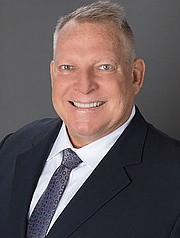More bad news
As consultant points out flaws, City Council majority gives Mayor Stoney a choice to withdraw the $1.5B Coliseum and Downtown development plan or have it stricken
Jeremy M. Lazarus | 2/7/2020, 6 a.m.
The bad news just keeps coming for the doomed $1.5 billion proposal to replace the Richmond Coliseum and develop an area of Downtown around it.
First, despite a series of snafus, the House of Delegates on Monday halted a last-ditch plan to steer state sales tax revenue to help pay for the development, a move Mayor Levar M. Stoney and other advocates considered essential to persuading the required seven Richmond City Council members to back the deal.
Then later on Monday, a fed-up, five-member majority of City Council used a committee meeting to issue a choice to the mayor: Withdraw the ordinances for the proposal or prepare to see them stricken from the council’s agenda at its meeting on Monday, Feb. 10.
By a vote of 5-4 at the Organizational Development Committee, the council majority voted to recommend striking the papers from the council docket and also passed a resolution 5-3 to urge the mayor to pull the ordinances to avoid the rebuff. Councilman Michael J. Jones, 9th District, abstained from the second vote.
The vote to strike the ordinances is expected to come during the portion of the Feb. 10 meeting in which the council formally establishes its agenda, usually without a public hearing.
The five members leading the charge to kill the plan developed by the Navy Hill District Corp. led by Dominion Energy top executive Thomas F. Farrell II are council Vice President Chris A. Hilbert, 3rd District; Kim B. Gray, 2nd
District; Kristen N. Larson, 4th District; Stephanie A. Lynch, 5th District; and Reva M. Trammell, 8th District.
Council members who want to keep the ordinances alive at least until Monday, Feb. 24, when a final vote is scheduled are council President Cynthia I. Newbille, 7th District; Andreas D. Addison, 1st District; Ellen F. Robertson, 6th District, and Dr. Jones.
So far, Mayor Stoney has not withdrawn the ordinances.
The hope for state help collapsed when the House Finance Committee tabled for a year a bill that would authorize Richmond to use state sales taxes to be generated by the development to help pay for a new Coliseum and other parts of the develop- ment, which includes a new hotel, new offices, more than 2,000 apartments and new retail stores and restaurants in a 10-block area in Downtown around the Coliseum.
The committee’s action reflected the decision of the legislation’s sponsor, Richmond Delegate Jeff M. Bourne, the lone member of the city’s delegation to be involved. He announced last week that because of division on City Council about the project, he was withdrawing his support for action on the measure this year and wanted the bill deferred.
The mayor’s options were issued after the nine council mem- bers heard an extended briefing from a council-hired consultant, who offered a mixed review of the proposed development. While Charles H. Johnson and his team from Johnson Consulting of Chicago generally gave a thumbs up to what he called a potential “world-class project,” he also suggested that projections for the arena’s use were inflated. He also criticized the city for failing get an appraisal on city-owned property that would be sold to private interests for the project, and noted that Richmond still could attract major development to the area without building a new Coliseum.
Mr. Johnson projected that a new arena and the associated development could generate at least $700 million in new taxes through 2048, a nearly 30-year period.
But he also estimated that Navy Hill would need the city to contribute at least $385 million in real estate taxes from outside the 22-acre development area in order to repay the borrowing costs to build a new Coliseum.
He projected that, including the city contribution, the total tax revenue the proposed development could generate might top $1.15 billion between 2021 and 2048.
However, he estimated that 53 percent, or more than $600 million, would need to go to repay the loans to build the Coliseum — with the city having to wait 16 years to see any substantial flow of new tax dollars to the general fund that pays for schools, police, fire, trash collection and other key services.
His report also undermined a key talking point used by Mayor Stoney and Navy Hill proponents. In Mr. Johnson’s view, if the Coliseum replacement plan lives up to its billing, the city might earn about $500 million in new revenue through 2048 after the arena is paid off, or well short of the $1 billion the mayor and Navy Hill backers have stated.
Mr. Johnson’s report also refuted Mayor Stoney’s claims and those of Navy Hill officials that no development would take place in that Downtown area if a new Coliseum is not included.
If a new arena were eliminated from the plan, Mr. Johnson and his team estimated that the 10 blocks of Downtown are so ripe for development that the city could attract a hotel, new office buildings, new apartments, restaurants and retail that would generate a return to the general fund almost immediately after being built.
In his view, an arena-less project might generate up to $600 million in new taxes over the same 2021-2048 period. He did not estimate the amount the city might have to contribute for such a development; the city has estimated about $40 million.
Without the arena, “there would be less vitality,” Mr. Johnson said, and the development would take place more slowly, but it could be done.
Evidence of the development potential of the area bounded 5th and 10th streets between Leigh and Marshall streets, and in two blocks south of Broad Street, came from Virginia Commonwealth University, which has long wanted to obtain the former city Public Safety Building located on 9th Street, a block north of City Hall.
The university, which is willing to keep it as taxable property, rolled out more details of its plan to have a third party developer to create office space for at least 250 physicians and to include the Ronald McDonald House and The Doorways hotel for VCU patients and families on the site.
Such information only has provided more ammunition for the City Council majority, which sees the project as sopping up essential funds needed for public education and other services.
Mr. Hilbert also is adamant that he wants to see efforts to get Richmond’s neighboring counties involved with a new arena project, just as they are partners in Richmond International Airport, the Greater Richmond Convention Center and other initiatives with regional impact and implications.
Like other council members, Ms. Lynch believes the Navy Hill plan was created without the transparency and public inclusion needed. She said her decision to oppose the project “is not about saying ‘no’ to development; it’s about saying ‘yes’ to smart investment growth and a new way of doing business. It’s time to shake the shadow deals of the past and allow for new growth in the sunshine.”
City Council member’s employer getting emails to pressure her to change vote
One member of City Council is seeing her employer dragged into her opposition to the $1.5 billion Coliseum replacement and Downtown redevelopment plan.
Councilwoman Stephanie A. Lynch, 5th District, reported that executives at Good Neighbor, where she works, are getting emails from people in a bid to pressure her to change her position.
Ms. Lynch told the Free Press about the situation Wednesday, but acknowledged that no one from the company, which provides housing and mental health services to the people with mental health challenges, has mentioned the emails to her.
She is a senior executive at Good Neighbor, where she serves as director of government affairs, business develop- ment and organizational strategy.
Still, she is concerned about the tactics to get her to change her mind and considers them inappropriate. She noted in a statement that she and other members of City Council “continue to get bombarded by countless emails from Navy Hill partners and business leaders who are tied to the project, all of whom live outside the city.
“They have even begun reaching out to my employer, sending emails to my CEO in an effort to apply pressure,” Ms. Lynch stated.
Despite that effort, she stated she will not reverse her decision and is buoyed by the emails, calls and notes of support from constituents for her stand against “a risky, publicly subsidized development.”
She noted that Johnson Consulting, a firm hired by City Council, found that the proposed 80-block tax increment- financing district from which property taxes would be taken to finance the proposed arena, “posed a significant risk” and that the development would not deliver “a significant return on in- vestment until year 16.”
Ms. Lynch also cited the consultant’s finding that the proposed average rent for the “affordable housing” included in the development would run $1,600 a month.
“This could lead to rapid and accelerated gentrification above and beyond what is happening now,” she stated.










